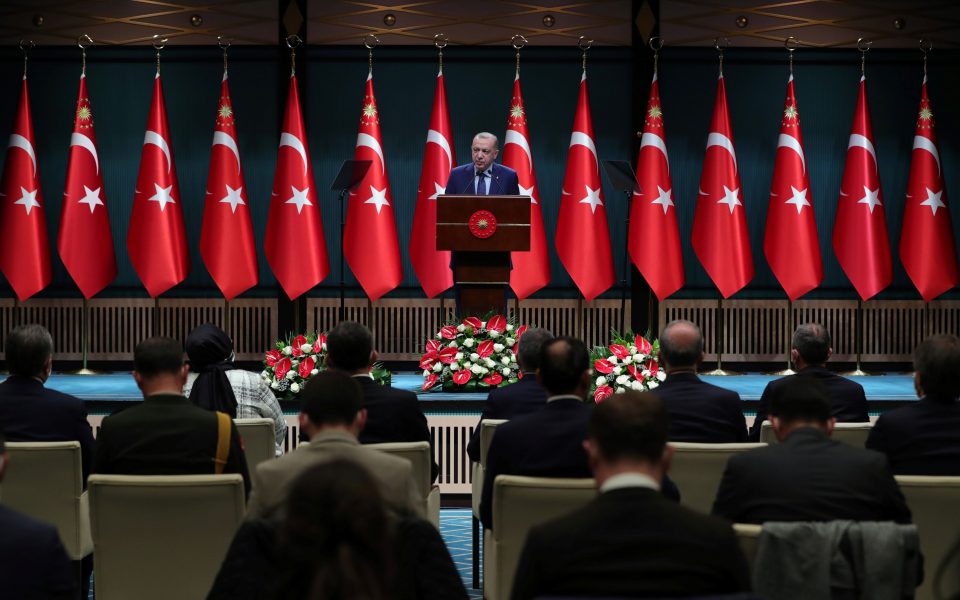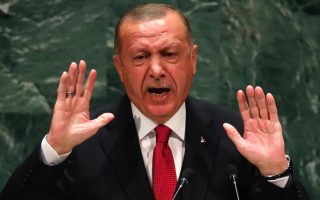The Turkish dictator and President Biden

Nearing 20 years in power, Recep Tayyip Erdogan is now dealing with his fourth United States president. Erdogan is accustomed to building a rapport with new presidents early in their terms. His strategy was successful at the beginning of both the Obama and Trump administrations, before US-Turkey relations took a turn for the worse. After a dizzying last quarter of the Trump Presidency – which included the imposition of CAATSA sanctions for Turkey’s purchase of Russia S400s and Secretary of State Mike Pompeo openly scolding Turkish Foreign Minister Cavusoglu during a virtual NATO summit – Ankara was certainly ready for a fresh start.
Erdogan’s regime was already quite familiar with President Joe Biden and key members of his team. There were plenty of moments on the 2020 campaign trail – including Biden’s scathing critique of Turkey during a New York Times editorial board meeting, his promise to recognize the Armenian Genocide, his criticisms of Turkish moves on Hagia Sophia and Varosha – that should have given Ankara pause. But Erdogan could have been forgiven for assuming that this was election year posturing and that much of it resembled Barack Obama’s 2008 campaign promises on the same issues, which were quickly forgotten once he got into office.
If Erdogan had been counting on his third consecutive “reset” with a US administration, President Biden has disappointed him. During a first 100 days dominated by domestic policy and getting past Covid, the Biden administration has done enough on Turkey to leave Erdogan on edge and off-balance.
The catalogue of specific moves at the outset of the Biden Presidency has exceeded the expectations of even the president’s most loyal supporters. Imagine having to brief Erdogan on the following over the last few months: the appointment of Brett McGurk to the National Security Council; Secretary of State Antony Blinken’s commentary on Turkey during his confirmation hearing and his rebuke of Turkey’s stance on Cyprus during a later appearance before the House Foreign Affairs Committee; the State Department’s open condemnation of government crackdowns at Bogazici University, the sham prosecution of Osman Kavala and Henri Barkey, and moves against the pro-Kurdish Peoples’ Democratic Party (HDP); the rollout of the CAATSA sanctions; the legal briefs filed by the Justice Department and State Department that allowed the lawsuit against Turkey in the Sheridan Circle case to move forward. On top of that, imagine having to explain how Greek Prime Minister Kyriakos Mitsotakis has already spoken to President Biden while Erdogan still waits.
Steven Cook, the Eni Enrico Mattei senior fellow for Middle East and African studies at the Council on Foreign Relations, notes the significant departure from the approach towards Turkey over the last several administrations: “It doesn’t seem that quiet diplomacy is in the policy. Ned Price [the State Department spokesperson] has been forthright and strong from the podium.” During the Obama and Trump administrations, the US was often caught sending mixed signals to Turkey. According to Cook, “what has been a surprise [under Biden] is that the signals have not been mixed. The president and his team are not going to overlook American values.”
This clear commitment to democracy and human rights is notable, argues Alan Makovsky, senior fellow for National Security and International Policy at the Center for American Progress. “The Biden administration has Turkey covered like a blanket like no administration before. So far it’s mostly rhetorical, but it is comprehensive. If you are a democrat in Turkey, you are happy that you seem to have a friend in the White House.”
This more clear-eyed policy on Turkey is not necessarily a surprise to those who have been following Washington closely. Congress had already adopted a more aggressive stance than the previous two administrations. Over its last two sessions, Congress forced the issue on CAATSA sanctions and on ejecting Turkey from the F-35 program, unanimously adopted the Armenian Genocide resolution through the Senate, passed the Eastern Mediterranean Security and Energy Partnership Act, and has instituted an informal arms embargo on Turkey. In this latest session, Congress has issued wide-ranging written critiques of Turkey’s record on human rights and democracy, with more than 50 senators and 170 representatives signing letters.
For Makovsky, this backdrop signals a bigger problem for Turkey. “With Trump’s departure, Turkey has no real supporters left in Washington. Even at State and Department of Defense, where there is still appreciation for Turkey’s strategic potential, there is ever growing doubt about its willingness to be a partner and there is also a strong sense that the worst is yet to come in term of human rights abuse. Turkey’s stock in Washington is in free fall, and nobody is expecting Erdogan to do what is necessary to reverse that trend.”
No one should take all this as any type of signal of a full rupture in US-Turkey relations. There seems to be a new Washington consensus that while a loving relationship with Turkey will not be re-established, a working one must be found. And thus the US is arranging for talks on Afghanistan to be held in Turkey and urging the EU to hold off on a more aggressive posture with regard to sanctions on Turkey.
Cook points to Turkey’s ability to compartmentalize relations with other countries (like Russia) and argues that the US can adopt a similar approach to Ankara: “Work with Turkey where you can, work against it where you must, and where the stakes are low stay out of each other’s way.”
Makovsky sees two key upcoming milestones – whether the Biden administration recognizes the Armenian Genocide (he believes it will) and whether Turkey bans the HDP. A rupture in the bilateral relationship will not necessarily ensue, but Turkey may finally realize how politically and diplomatically isolated it really is in the United States.
Erdogan has long operated under the assumption that the US will blink first in a stare-down with Turkey. But in 2021, he is staring down a president and administration that has more experience, a clearer world view, and more political cover to “not blink” than any he has ever faced. It is still early, and the Biden administration has to maintain consistency, but when it comes to US-Turkey relations, blunt diplomacy is on track to replace the failed quiet diplomacy of the past. Will this result in Erdogan changing behavior or Turkey moving on from Erdogan?
Endy Zemenides is the executive director of the Hellenic American Leadership Council (HALC).




